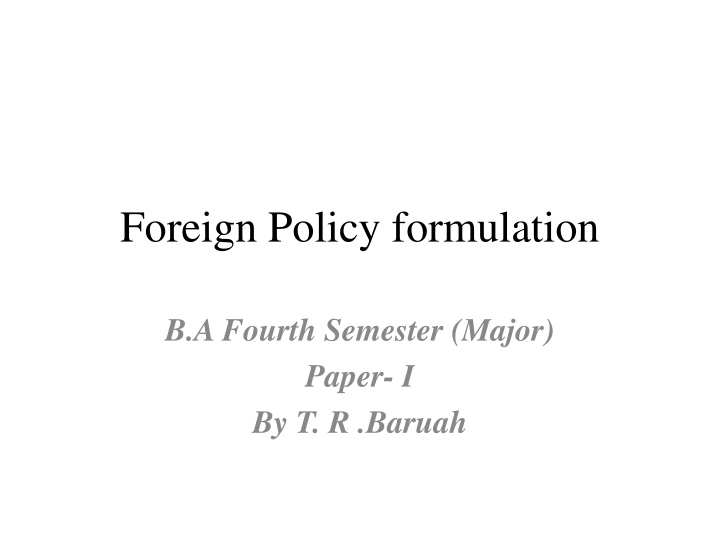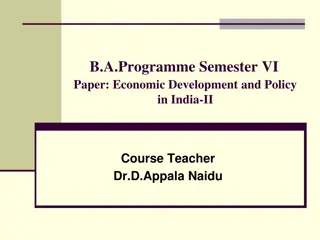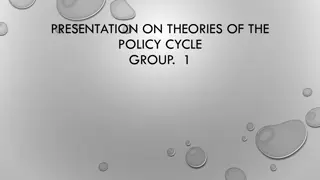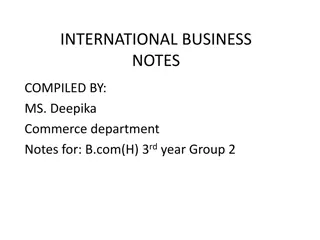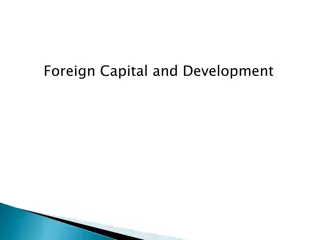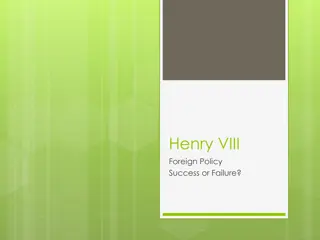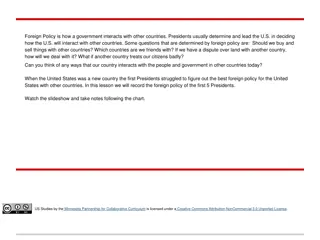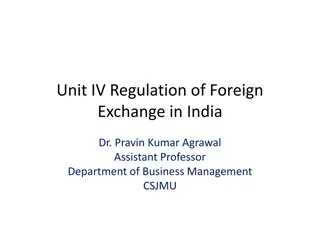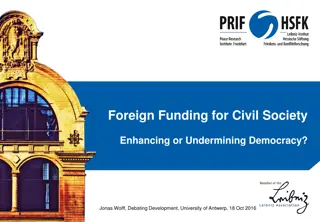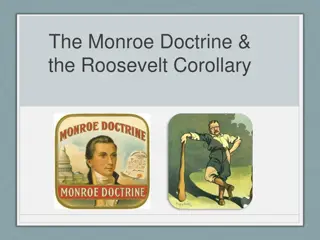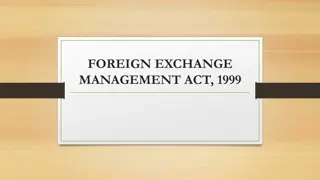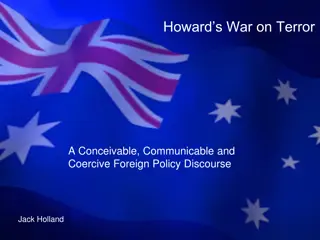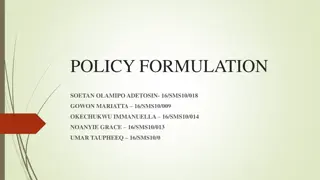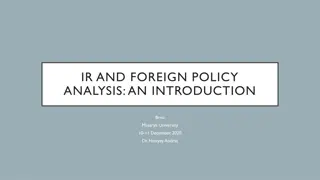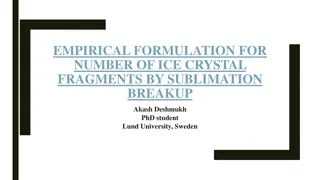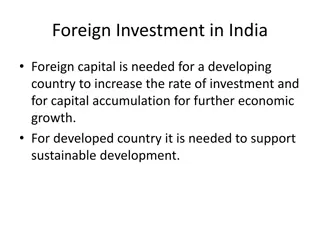Foreign Policy Formulation: Key Concepts and Principles
Foreign policy plays a crucial role in international relations, guiding how nations interact and pursue their interests. This paper delves into the definition, objectives, and principles that shape foreign policy formulation, emphasizing the importance of safeguarding national interests and promoting international cooperation.
Download Presentation

Please find below an Image/Link to download the presentation.
The content on the website is provided AS IS for your information and personal use only. It may not be sold, licensed, or shared on other websites without obtaining consent from the author.If you encounter any issues during the download, it is possible that the publisher has removed the file from their server.
You are allowed to download the files provided on this website for personal or commercial use, subject to the condition that they are used lawfully. All files are the property of their respective owners.
The content on the website is provided AS IS for your information and personal use only. It may not be sold, licensed, or shared on other websites without obtaining consent from the author.
E N D
Presentation Transcript
Foreign Policy formulation B.A Fourth Semester (Major) Paper- I By T. R .Baruah
Introduction: Foreign Policy is one of the wheels with which the process of international politics operates. It is an important key to the rational explanation of international behaviour. It is not very easy to understand the interstate rela- tion without understanding the foreign policy of the states. It is very essential to learn the concept of foreign policy before deducing any conclusion in international politics. It consists of the national interests of a state that are to be furthered in relation to other states and thus foreign policy could be regarded as a part of national policy. Present situation is such that all countries of the world are interdependent so foreign policy formulation is very important part of national policy. Foreign policy may be broadly defined as the policy of nations towards other nations. According George Modelski-It is the system of activities evolved by the communities for changing the behaviour of other nations and adjusting their own activities to the international environment. Foreign policy involved the formulation and implementation of a group of principles which share the behaviour pattern of a state while negotiating with other states to protect and further its vital interests.
Foreign policy could be defined as a key concept in the process by which a state translates its broadly conceived goals and interests in to concrete course of action to attain these objectives and preserve its interests. A foreign policy is a set of pre-established strategies designed and implemented systematically to manage a country's relationships with other nations. They are structured guidelines that regulate international political dealings. Foreign policy or foreign relations refers to how a government deals with other countries. The government chooses its foreign affairs policy to safeguard the interests of the nation and its citizens. Objectives of foreign policy : The objectives of a nations foreign policy are- 1.To maintain the integrity of the states. 2.To promote economic interests with other states 3.Providing national security and protecting national prestige. 4. Developing national power and maintaining national order etc. The sum total of the goal objectives of a nations foreign policy constitute its national interest.
Principles of Foreign Policy: There are some necessary principles to be followed by all nations while formulating its foreign policy. These are- 1. To safeguard the territorial integrity of the state is the first essential principle of foreign policy. It is the primary duty of the state to protect the property of its citizens and to safeguard their interests. In this connection those states who aims at protecting their own territory follow the policy of Status quo. 2. Another principle is the theory of bargaining. Interdependence of the states is an important phenomenon in international politics. All states whether big or small are interdependent . Foreign policy tries to create a balance with bargaining. 3. Protection of national interests is another important principle in the foreign policy formulation. Foreign policy seeks to promote its national interests ,as the primary interest of each state is self preservation, security and well being of its citizens. 4. To promote the economic interests of the country is another principle of foreign policy. Thus such a foreign policy should be formulated which could help in the economic prosperity of the state . Foreign policy also aims at enhancing the influence of the state in international field.
Determinants of foreign policy: There are some determinants which play very important role in conditioning foreign policy. In formulating foreign policy these factors are very important. Some of these are permanent and some are temporary. Fundamentally foreign policy had its root in unique historical background, political institutions ,economic needs , peculiar geographical conditions and values held by a nation. The determinants of foreign policy formulation are of three types Internal, External and policy making. Internal Factors- Within internal factors historical and national values are very important. The foreign policy is shaped and conditioned by the history and culture of the nations. From history alone the state inherits its style and culture which in their turn influence and decide the course of action of a nation which is to be followed by a nation in relation to other states. History is the record of doings of a community about its failures and success. These failures and success are important guide in the formulation of foreign policy .
Geography is also another internal factor that directly determines the national goals and aspirations. The size of a state s territory, its geography and population greatly influence its foreign policy implementation. National Capacity is a major element in the formulation of foreign policy. National capacity means military preparedness, technological advancement and economic development etc. The level of economic development of a country also influences the foreign policy of that country. The Ideology followed by a country also is an important factor. Ideology is the main basis as well as goal of foreign policy. The states establishes their political and economic institutions on the basis of their ideology and always try to translate these principles in to reality in the sphere of foreign policy. Some time nations make use of ideology merely to justify their policy. The ideological division of the world in the post world wars period between USA and USSR gave two types of foreign policies to the nations during that period. External factors- In the external factors mainly two elements are included-International Organisation and World Public Opinion. While formulating foreign policy the states are to take a note of international laws . Moreover, a state while
implementing its foreign policy cannot afford to ignore the rules of International law and canons of international morality. The international law is generally defined as a set of rules that regulate relations between states. The existence of international law and international norms limits the freedom of states in the system. A state s foreign policies is thus, often affected by its membership of international, regional and sub-regional organizations, since they surrender partially their sovereignty to these organizations. As their operations will be guided by the constitution of the organization; the policies of member states will undoubtedly be affected by the nature of the particular institution. At the same time the world public opinion is also another factor which should be considered by all countries in formulating their foreign policies. Policy making factors- Policy making factors are also very important in the process of foreign policy formulation. All the statesman including the policy makers play a decisive role . The final shape of the foreign policy is the handiwork of these elites. Decision makers act in accordance with their perception of reality. Therefore the head of
the government , the foreign ministers and the other policy makers play very important role in the process. In a Presidential form of government the President and in a Parliamentary form of government the Prime Minister dominates the policy formulation. In this connection the foreign ministers are also very important. Apart from the above mentioned factors the final shape of the foreign policy is given by the legislature of a country. It involves the interplay of a wide variety of basic determinants , political institutions and the role of the policy makers. Some other political institutions such as the public opinion and pressure groups etc. could also be regarded as major instruments for determining the decisional system. Finally the personality of the decision makers , their ideological convictions ,psychological factors inevitably give the final shape to the foreign policy of a state. The diplomacy is the instrument through which foreign policy is executed. Foreign Policy represents the substance of foreign policy and diplomacy provides the personnel machinery for the implementation of the foreign policy, moreover diplomats are the established channel of communication between the states. It is the real instrument through which the foreign policy is executed.
Thus we can conclude that the internal environment of a state influences the nature and course of its foreign policy. Countries differ in size, socioeconomic development and political regime. They also differ in their political institutionalization and societal structures, military and economic capabilities, and strategic cultures. In the same way, public opinion, national role conceptions, decision making rules and personality traits of political leaders vary from one state to another. These differences directly affect both foreign policy making process and foreign policy decisions. But the level of influence between domestic and international determinants of foreign policies may vary from state to state and the political environment in which these states exist. In some countries, international factors play a major role, whereas in some other countries, domestic determinants are more important. Thank You
